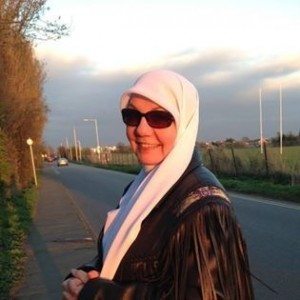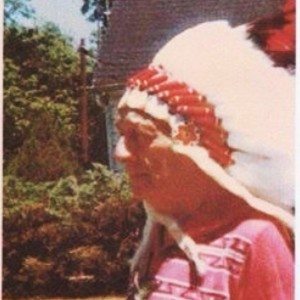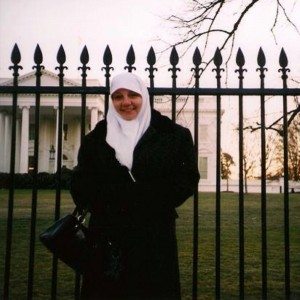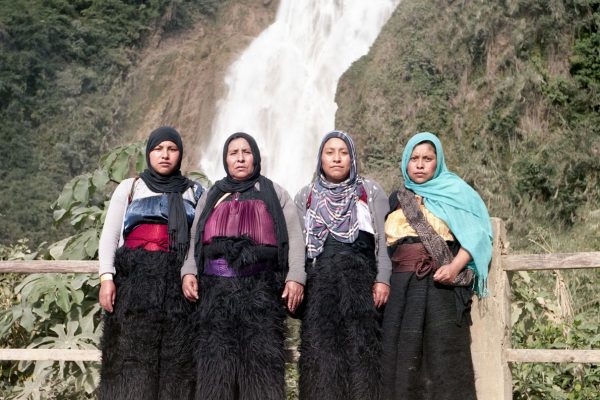When I stated shahada, I was stared at in disbelief. I think it was the last thing anyone ever expected from me. The very first response was “No! You don’t want to do that! You don’t mean that! You don’t know what you’re saying!” But I was ready. I said I did. I said I had studied very hard, and began to pile books out from under the couch and all over the apartment. I had a book hidden in each section of my house.
This is part two of an interview with Dr Maryam Blackeagle. Part One can be found here.
Q: You saw the truth. Riveting words. What happened to you after that? What change does one experience after having the pride knocked out of them?
I’ve heard so many beautiful stories from converts to Islam. The joy, the tears of happiness while stating shahada in the masjid with their friends and loved ones, the cries of takbir, the hijab parties, the mentors – many beautiful stories masha’Allah. I had none of that. The day I embraced Islam was the most humiliating day of my life.
I didn’t want it at all, but I couldn’t refuse it. I didn’t choose Islam – Islam chose me. I simply could not deny the Truth when I saw it. I felt awful for a long time. Seeing yourself that clearly… it’s not easy. Realizing how lost you are is extremely painful.
Q: What did you hold onto for guidance?
I didn’t want it at all, but I couldn’t refuse it. I didn’t choose Islam – Islam chose me. I simply could not deny the Truth when I saw it.
A: I kept quiet about it for some time. I continued to read the books from the bag I had received. It contained some books of jurisprudence, some of Ali Shariati’s work such as Fatima is Fatima, and Nahjul Balagha. I saw such beauty and grace in Fatima, the daughter of the Prophet Muhammad, and so much wisdom in Nahjul Balagha. I knew nothing of Sunni vs Shia. I just knew these books contained peace and morality. There was also a book called Husain, Savior of Islam, which I didn’t like because of the title. I had only heard the term “Savior” in reference to Christ so I kept putting it aside as distasteful. After reading another book about Imam Hussain and being drawn to his story, however, I went back to read this one and truly felt who he was rather than just know of him.
The more I read, the more I knew that this path was the Truth. I read the Bible like I had never read it before and found Islamic truth in almost every page. It was the first time I read the Bible from a different perspective than what the preachers have taught me.
Critical thought is imperative in religion. Too many see only what others tell them to see. At this time in my life, I had learned to see through my own eyes and I saw so much Islam there. I knew eventually I would have to come forward about what I believed to my friends, but it was hard because I knew too well what my initial intention had been and I felt very ashamed at my arrogance and ignorance.
If God decides to guide you, it doesn’t matter if you’re the only person on Earth.
Finally, I decided to tell the person who gave me the books. When I stated shahada, I was stared at in disbelief. I think it was the last thing anyone ever expected from me. The very first response was “No! You don’t want to do that! You don’t mean that! You don’t know what you’re saying!” But I was ready. I said I did. I said I had studied very hard, and began to pile books out from under the couch and all over the apartment. I had a book hidden in each section of my house.
The first conversation I had after becoming a Muslim publicly was to defend Islam. Each and every one of my Muslim friends gave me a hard time about it. But instead of discouraging me, I found I became even more determined to learn more. My first lesson was to learn what my friends knew nothing about: the difference between Islam and Muslims. It would be three and a half years before I met a practicing Muslim.
Q: “The difference between Islam and Muslims” Explain what you learned about that, please.
A: My friends knew very little about true Islam and they would argue with me each step of the way. From Arabic being impossible to learn (so prayers were out of question), to a woman’s status in Islam. They would say things like “a woman’s worth is only half that of a man’s,” and that the Quran says “a woman only has half a brain.” When I began trying to purify my life from drinking etc, they would argue with me even then. They called themselves Muslim but there was no Islam in their lives.
I walked into what turned out to be a Wahhabi masjid through the men’s section – in my jeans and t-shirt, I might add – smiling and saying salaam, I was very quickly escorted outside.
However, I found that the more I tried to purify my life, the happier I felt. You need to understand the world in which I lived in. Even though I had been an honor student at school, I had been taught that my only value was in my looks. I lived in a world where the priority was to satisfy desires of the flesh, not the spirit. And yet I found in my studies of these books, such as the one on Fatima, that I was a creature born of dignity; that I had a right to be treated with dignity and I had a responsibility to treat myself with respect. You cannot imagine how huge that was for me. Just as one can’t truly appreciate light until they have lived their life in darkness. Little by little, I cleansed my life and found peace and a self-respect that I really never knew was entitled to me.
One day, I was getting dressed and looked in the mirror and realized for the first time in my life, I liked the person looking back at me.
Islam taught me that I mattered – that self-respect mattered. I learned that not only did God not hate me, He actually loved me enough to show me to love myself. It truly was Allah that was leading me as if by the hand.
Q: How did you learn how to practice Islam, since you didn’t have many sources to teach you?
A: As I said, it was three and an half years before I knew any practicing Muslims. I had my books but I didn’t have any how-to books and my “Muslim” friends only wanted to lead me away from Islam. I saw on the news that the month of Ramadan had started and I knew that meant fasting so… I quit eating.
Q: Altogether?!
 A: It was the summer of 1984, in Southern California with the temperature about a hundred degrees. I was driving in my car when I realized I was about to pass out, so I thought “I wonder if it would be cheating if I got up before dawn and ate or drank something.” Just like that, by intuition, Allah taught me suhoor! If God decides to guide you, it doesn’t matter if you’re the only person on Earth.
A: It was the summer of 1984, in Southern California with the temperature about a hundred degrees. I was driving in my car when I realized I was about to pass out, so I thought “I wonder if it would be cheating if I got up before dawn and ate or drank something.” Just like that, by intuition, Allah taught me suhoor! If God decides to guide you, it doesn’t matter if you’re the only person on Earth.
I knew from the Quran that I should pray, but I had no idea how to. There was a verse in the Quran that stole my heart so I memorized it in English and would stand and recite it. I had seen on TV that Muslims prostrated in prayer so I would recite the verse (Ayatul Kursi) then prostrate and say shahada, sit and look to my left and right saying shahada. That was my prayer for three and a half years.
I did what I could from the sincerity of my heart and I hope those prayers were accepted. Allah is the All-Merciful, after all.
Until I moved to Oklahoma did I meet other Muslims. The whole world had opened up for me then and I was able to begin formal studies.
Q: That’s incredible. All this time you were a Muslim on your own? And you believed in God and that the Quran was the word of Him?
A: Yes. It was just me and my bag of books and Allah.
Q: What was your experience in Oklahoma like?
A: [laughs] When I first moved there, I looked in the phone book for an address of a masjid. I wasn’t wearing hijab yet, so when I walked into what turned out to be a Wahhabi masjid through the men’s section – in my jeans and t-shirt, I might add – smiling and saying salaam, I was very quickly escorted outside. The men then asked me what my proofs were. I didn’t really know what they meant by proofs, so I just said “Well, I have the Quran and Nahjul Balagha!”
Looking back now, I know how funny it all was, but at the time, I had no idea why they reacted as they did. They were like “Nahjul Balagha?!” Afterwards they gave me a woman’s phone number, but when I called her and started discussing the sermons of Imam Ali, she wasn’t interested in talking to me anymore. So that was pretty much the end of that.
For the first time in my life, I truly felt like I had a family. My community there was quite small. We would meet at my home each week and hold du’aa sessions. Those were some of the happiest days of my life.
I was still alone, but one day, while at a Walmart, I saw a woman in hijab. This was so new to me, I began to follow her around the store. When she would look my way, I would hide behind the clothes racks. [laughs] I didn’t know what to say to her and my previous experiences with telling other Muslims I converted didn’t exactly go too well, so I was too shy to approach her. I began to realize that she knew I was following her because she was acting really nervous. So I plucked up the nerve to walk up to her and say salaam. She returned my salaam but stared me up and down suspiciously. I pointed at myself and said “Muslim.” She was quite surprised and asked, “Muslim?” I nodded, and she smiled. She didn’t speak any english but her husband did and we were able to talk through him and exchange phone numbers. All the while, I was able to get a good look at her hijab. When I went to visit her for the first time, I came wearing a hijab like hers.
We became good friends and when I mentioned Nahjul Balagha, she got very excited and started calling people she knew. This is how I found my community and then my access to scholars.
Q:What was that community like? Were they accepting of you? Did they make you feel like you belonged with them?
A: For the first time in my life, I truly felt like I had a family. My community there was quite small. We would meet at my home each week and hold du’aa sessions. Those were some of the happiest days of my life. I was able to connect with scholars around the world and truly mature as a Muslim. While making Islam my complete way of life, I found the ability to put aside the self-destructive behaviors that had caused so much damage in my life.

Substance abuse is not an easy thing to shake off. I had tried several different programs in the past but nothing worked for me. It was only when I completely submerged myself in my faith that I was able to break free from it. I know it’s best not to talk about these things and often after one of my lectures, people would come up to me and suggest I not tell anyone about that part of my past, and I understand that. I’m not proud of any of it but I do believe that everything happens for a reason. I struggled on that path for a reason. There were lessons in it, lessons that are meant to be shared. I believe my life is an example of the power of Allah and what faith can do to redirect your journey.
Q: Subhan’Allah, I believe that too. I wish you a wonderful future and ongoing peace throughout the rest of your journey. Before we wrap this up, do you have anything to say to the reader who might be going through difficult circumstances right now? To the abused, the lonely, the neglected, the lost, the depressed, or the betrayed?
A: Ameen, and the same and more for you. Thank you.
Our essence is not this physical self. This is just the carrier that we use in this life. We are not physical beings in search of a spiritual experience, we are spiritual beings that are having an earthly experience. In order to understand this, we must free ourselves from the clutter of the mind, from the thoughts that evolve from the ego; fear, desire, etc. We are not our minds, we are the spirit behind all of that clutter. We have to lift the veil to see our true selves.
There are 4 mental affirmations that you can do that may help you lift the veil and free yourself towards enlightenment:
One:
Say to yourself: I am in Allah’s presence; I am never alone. Wherever I go, whatever I do, whatever I think, Allah is here witnessing it. Allah is closer to me than my jugular vein. His Knowledge and Presence is all-encompassing. Impress this within you until it resounds with each heartbeat. It will truly effect your thoughts and your actions.
Imam Zainul Abideen had said in a du’aa
“…the journey to You is short, You are never far or disconnected from your creatures. You are never veiled from them except for the veil they themselves place by having hope in other than You.”
Two:
Say to yourself: Everything I have has been given to me by Allah. All that there is, surrounding you, in you, comes from Allah. Reflect on all of the barakat, all the blessings that God bestowed upon you. There is so much! Be grateful for it. Live with an attitude of gratitude.
Three:
Recognize that hardship is a natural aspect of life. One of the greatest veils that we place between us and Allah is the bewilderment of ‘Why does Allah allow suffering and strife? Since He is so Great and Merciful, why does He allow us to struggle and hurt?”
Life is a test of struggles. We cannot escape this. It’s not the hardships of life that define you, but how you respond to them. Train yourself to look for the wisdom in the strife. Struggle is an activator. It is the fuel for change and development.
Four:
Unclutter your life. Especially your mind. Simplify your path so that your direction can be clear. Open yourself for the opportunity of enlightenment. We all have busy schedules; life is hectic, but the majority of stress we face is only an illusion of our own creation. Realize you are not the thinker but the spirit behind the thoughts. Let that spirit drive your life and not your thoughts. Take time for what matters most; your spiritual clarity. When you have this, the rest will fall into place.
 Life will always have stress. There will always be suffering. It is the nature of life to have hardships. When you live a life that is driven by fitrah, you see a purpose to it and the wisdom behind it. We need conflict in order to evolve spiritually. The opportunity for spiritual growth would not be present without it. Iman fluctuates but fitrah is fixed. Your spirit knows the source from which it came from, it knows its sustenance, and it knows its ultimate destiny. A life guided by fitrah is a life that is lived from God, in God, to God. The 13th sura of the Qur’an tells us: “ Let it be known to you, that it is only the remembrance of Allah that will bring peace to you.”
Life will always have stress. There will always be suffering. It is the nature of life to have hardships. When you live a life that is driven by fitrah, you see a purpose to it and the wisdom behind it. We need conflict in order to evolve spiritually. The opportunity for spiritual growth would not be present without it. Iman fluctuates but fitrah is fixed. Your spirit knows the source from which it came from, it knows its sustenance, and it knows its ultimate destiny. A life guided by fitrah is a life that is lived from God, in God, to God. The 13th sura of the Qur’an tells us: “ Let it be known to you, that it is only the remembrance of Allah that will bring peace to you.”
This enlightenment can be a part of your life just as easily as it was for Moses. He merely said “Ya Rabi” and Allah responded to him. There is hadith that Moses asked Allah: “Is this just for me?” and Allah said “No, it is for anyone who attaches themselves to Me.” As Allah promises in the Qur’an: “Call on Me. I will answer you.” and in the hadith: ‘take a step towards Allah and He (swt) will come running toward you.





